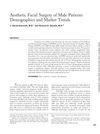 8 citations,
December 2015 in “Daehan han'yi hag'hoeji/Journal of Korean medicine”
8 citations,
December 2015 in “Daehan han'yi hag'hoeji/Journal of Korean medicine” Transtherapy significantly improved moderate to severe acne scars without side effects.
 7 citations,
January 2017 in “American Journal of Biological Anthropology”
7 citations,
January 2017 in “American Journal of Biological Anthropology” Sardinians were historically short due to a mix of genetics and factors like disease and poor nutrition, but recent height increases suggest better living conditions had a bigger impact.
 3 citations,
January 2019 in “Skin Research and Technology”
3 citations,
January 2019 in “Skin Research and Technology” Frequent use of hair straighteners can cause hair loss similar to scarring alopecia in young Turkish women.
 1 citations,
April 2021 in “Deneysel ve klinik tıp dergisi/Journal of experimental and clinical medicine”
1 citations,
April 2021 in “Deneysel ve klinik tıp dergisi/Journal of experimental and clinical medicine” Women with PCOS have a higher risk of metabolic syndrome and need lifestyle changes and treatment.
 February 2025 in “International Journal of Advanced Research in Science Communication and Technology”
February 2025 in “International Journal of Advanced Research in Science Communication and Technology” Fenugreek seeds may improve hair health and growth.

Mesotherapy is a promising alternative to minoxidil for hair loss with mild side effects.
 September 2023 in “Kerala Journal of Ayurveda”
September 2023 in “Kerala Journal of Ayurveda” Ayurvedic treatment helped a woman with PCOS resume regular periods and improve symptoms without side effects.
 September 2023 in “Medical lasers”
September 2023 in “Medical lasers” The botanical shampoo with Morus alba root extract is safe and effective for treating hair loss.
 October 2017 in “Journal of medical science and clinical research”
October 2017 in “Journal of medical science and clinical research” Obese people are more likely to have certain skin conditions like dark patches, stretch marks, skin tags, and bumpy skin.
 September 2016 in “Springer eBooks”
September 2016 in “Springer eBooks” Fat-derived stem cells may help treat skin aging and hair loss.
 January 2015 in “Springer eBooks”
January 2015 in “Springer eBooks” Fat-derived stem cells and their secretions show promise for treating skin aging and hair loss.
 September 2011 in “Journal der Deutschen Dermatologischen Gesellschaft”
September 2011 in “Journal der Deutschen Dermatologischen Gesellschaft” Effective treatments for scalp psoriasis include glucocorticosteroids, Vitamin D3 analogs, and combination therapies like calcipotriol and betamethasone dipropionate.

Avicennia marina extract and avicequinone C can potentially promote hair growth and treat hair loss by interfering with hair loss mechanisms and boosting growth factors.
 October 2000 in “Annals of Dermatology”
October 2000 in “Annals of Dermatology” Finasteride effectively treats hair loss in men with minimal side effects.
 209 citations,
September 2008 in “Dermatologic Therapy”
209 citations,
September 2008 in “Dermatologic Therapy” Androgens can both increase and decrease hair growth in different parts of the body.
 180 citations,
September 1999 in “British Journal of Dermatology”
180 citations,
September 1999 in “British Journal of Dermatology” Hair loss affects self-esteem and quality of life; treatments can help.
 107 citations,
August 2014 in “Dermatologic Surgery”
107 citations,
August 2014 in “Dermatologic Surgery” PRP injections improve hair thickness for baldness.
 102 citations,
February 2008 in “The FASEB Journal”
102 citations,
February 2008 in “The FASEB Journal” One minoxidil-sensitive potassium channel exists in human hair follicles.
 99 citations,
July 2017 in “Clinical Reviews in Allergy & Immunology”
99 citations,
July 2017 in “Clinical Reviews in Allergy & Immunology” New treatments for Alopecia Areata show promise but need to be more effective and affordable.
 83 citations,
December 2001 in “Journal of Investigative Dermatology”
83 citations,
December 2001 in “Journal of Investigative Dermatology” Minoxidil boosts hair growth by targeting adenosine and possibly sulfonylurea receptor 2B.
 53 citations,
August 2019 in “Journal of The American Academy of Dermatology”
53 citations,
August 2019 in “Journal of The American Academy of Dermatology” Oral minoxidil and topical minoxidil 5% both effectively improve female-pattern hair loss with safe side effects.
 50 citations,
December 2010 in “Dermatologic Surgery”
50 citations,
December 2010 in “Dermatologic Surgery” Laser treatment can stimulate hair growth for male pattern hair loss.
 40 citations,
September 2017 in “F1000Research”
40 citations,
September 2017 in “F1000Research” Oral minoxidil effectively reduces hair shedding in women with CTE, with no major side effects.
 26 citations,
May 2021 in “International Journal of Molecular Sciences”
26 citations,
May 2021 in “International Journal of Molecular Sciences” Cheonggukjang may help prevent and manage various diseases and improve overall health, but its odor and safety concerns need addressing.
 25 citations,
January 1998 in “Dermatology”
25 citations,
January 1998 in “Dermatology” Male pattern hair loss negatively affects quality of life, but drug treatments can help.
 16 citations,
May 2020 in “Journal of The European Academy of Dermatology and Venereology”
16 citations,
May 2020 in “Journal of The European Academy of Dermatology and Venereology” Sublingual minoxidil effectively treats hair loss with mild side effects.
 16 citations,
March 2020 in “Journal of The American Academy of Dermatology”
16 citations,
March 2020 in “Journal of The American Academy of Dermatology” Oral bicalutamide is safe and effective for female hair loss.
 15 citations,
September 2018 in “Medicine”
15 citations,
September 2018 in “Medicine” Childhood ptosis can vary from a minor cosmetic issue to a serious condition and may signal other health problems.
 14 citations,
November 2005 in “Facial Plastic Surgery”
14 citations,
November 2005 in “Facial Plastic Surgery” Men are an untapped market for facial cosmetic procedures, with a rise in nonsurgical treatments and potential for growth in older age groups.
 11 citations,
November 2019 in “Journal of the American Academy of Dermatology”
11 citations,
November 2019 in “Journal of the American Academy of Dermatology” Oral tofacitinib is a promising treatment for beard hair loss in alopecia areata.






























